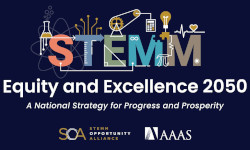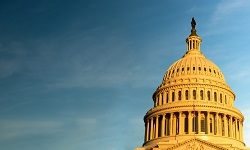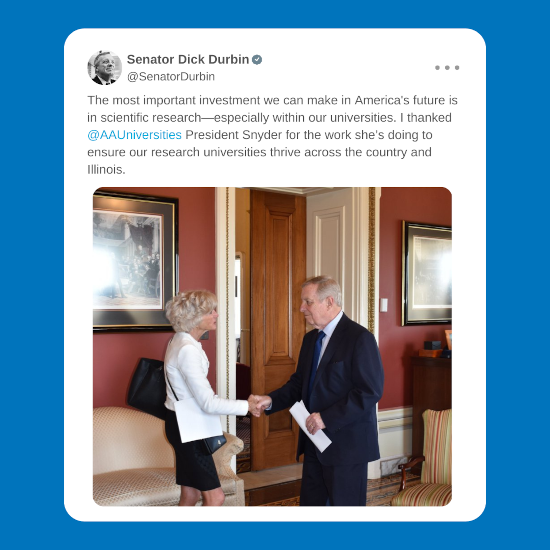 STEMM Opportunity Alliance Launches National Strategy to Diversify and Expand STEMM Workforce by 2050
STEMM Opportunity Alliance Launches National Strategy to Diversify and Expand STEMM Workforce by 2050
A nationwide alliance of more than 200 cross-sector organizations, including AAU, recently launched a national strategy to diversify and expand the science, technology, engineering, math, and medicine (STEMM) workforce by 2050. The STEMM Opportunity Alliance announced “Equity and Excellence 2050: A National Strategy for Progress and Prosperity” last week at the 2024 White House Summit on STEMM Equity and Excellence.
The STEMM Opportunity Alliance was launched in December 2022 with the American Association for the Advancement of Science and the Doris Duke Foundation as its founding partners. The alliance engaged hundreds of leaders and community members across the nation over the last year to develop the strategy, which outlines five pillars essential to the goal of helping 20 million people from historically excluded and marginalized communities enter, contribute to, and thrive in STEMM.
The strategy is based on the recognition that diversity in STEMM is both essential to the scientific enterprise in the United States and critical for U.S. growth and competitiveness. The five pillars of the strategy focus on nurturing curiosity about STEMM in every child; developing skilled and diverse STEMM educators; reducing barriers in higher education; leveraging diverse minds in research and development by closing gaps in funding and opportunities for researchers; and ensuring that workers receive the support they need to thrive in STEMM.
Partners in the alliance have committed to take concrete steps to support the five pillars; the strategy includes specific metrics and evaluative tools to keep partners accountable. The White House Office of Science and Technology Policy released a fact sheet last week highlighting some of the partner commitments. As part of the alliance, AAU is working to create a STEMM ecosystem rooted in equity, inclusion, and scientific excellence by 2050. Read more about AAU’s commitment here.
#BBD0E0 »
 Republican Leaders Launch House-Wide Probes into Campus Antisemitism
Republican Leaders Launch House-Wide Probes into Campus Antisemitism
At a press conference last week, House Speaker Mike Johnson (R-LA) and several House committee chairs announced “a House-wide effort to crack down on antisemitism” on college campuses.
During the conference, House Committee on Education and the Workforce Chair Virginia Foxx (R-NC) announced that she has invited Yale University President Peter Salovey; University of California, Los Angeles Chancellor Gene Block; and University of Michigan President Santa Ono to testify before a new hearing entitled “Calling for Accountability: Stopping Antisemitic College Chaos.”
Other Republican leaders announced that their committees will start looking into whether universities receiving funding from the National Science Foundation and the National Institutes of Health are complying with funding obligations and with Title VI of the Civil Rights Act. House Judiciary Committee Chair Jim Jordan (R-OH) announced that he has asked the State Department how many foreign students in the United States on educational visas “have engaged in radical activity we’ve seen now day after day on college campuses,” while House Committee on Oversight and Reform Chair James Comer (R-KY) said that his committee will look into how pro-Palestinian organizations on campuses are being funded. Leaders also announced that they will examine the tax-exempt status of universities that have been accused of fostering antisemitism.
 New Data Puts U.S. R&D Spending in a Global Context
New Data Puts U.S. R&D Spending in a Global Context
New analysis from the American Association for the Advancement of Science finds that the United States continues to be the world’s biggest spender in research and development. But despite spending more in absolute dollars on R&D, the United States lags behind other nations in R&D intensity – R&D spending as a share of the gross domestic product.
The AAAS report found that, “Adjusted for inflation and cross-economy price differences, global R&D investment has tripled over the past 30 years, from $672 billion in 1992 to over $2.2 trillion as of 2021.” The United States funded 32% of global R&D in 2021, with China close behind at 27%. Despite spending the most on R&D, however, the United States is fourth in R&D intensity behind Israel, Korea, and Taiwan. The United States is also 12th when it comes to public spending on R&D and fifth in spending on basic science. The report also found that, since 2002, China has reported the largest growth in R&D expenditures (14%), while the United States is in fifth place, with an average annual growth in R&D expenditures of only 3.8%.
The report also provided comparative global data on nations with the largest research workforce, the highest number of approved patents, and the greatest number of peer-reviewed research articles published in scientific journals. The report found that China’s scientific publication output nearly quadrupled in the last decade and surpassed the U.S. publication output in 2021. China also outperformed the United States in the total number of patent applications granted and the total research workforce.
 ICYMI: Fund American Science
ICYMI: Fund American Science
News of Interest
The Chronicle of Higher Education: How Colleges Have Responded to Student Encampments – As pro-Palestinian protests and encampments continue to emerge on college campuses nationwide, university leaders “are grappling with how to balance students’ right to freedom of expression with campus safety concerns.” The Chronicle examined 50 such encampments and found that universities have taken a range of actions, including engaging law enforcement, taking disciplinary action, allowing the encampments to remain, and negotiating with the protestors.
NPR: Biden Says He Supports the Right to Protest But Denounces ‘Chaos’ and Hate Speech – In brief remarks last week, President Biden defended students’ right to protest while denouncing hate speech and violence. “We’ve all seen images and they put to the test two fundamental American principles,” he said, adding: “The first is the right to free speech and for people to peacefully assemble and make their voices heard. The second is rule of law. Both must be upheld."
Inside Higher Ed: Researchers ‘Shocked and Disappointed’ After NSF Budget Cuts – Despite promising to double the National Science Foundation’s budget by 2027, Congress cut the agency’s budget by 8% in FY24. “Congressional failure to restore NSF’s budget jeopardizes our country’s future economic and national security,” said AAU President Barbara R. Snyder. “Forcing NSF to make serious cuts also negatively impacts grant success for researchers interested in working on critical scientific advancements, further discouraging careers in STEM,” she added.
The Washington Post: Federal Student Aid Office Chief to Step Down Amid Criticism Over FAFSA – Education Secretary Miguel Cardona announced that Richard Cordray, the chief operating officer of the Office of Federal Student Aid will step down in June. His departure comes as the Education Department faces significant criticism for its handling of the rollout of the new Free Application for Federal Student Aid.
Times Higher Education: Canada and Australia Lose Allure for International Students – A new survey found that the United States is now the most preferred education destination for international students. Participants in the survey – current and prospective international students – “ranked the U.S. highest for quality of education, graduate employment opportunities, and value for money.” The findings are likely the result of a new student visa cap in Canada and “new visa processing policies” in Australia.
The Chronicle of Higher Education: Debating Israel’s Future, One Week at a Time – A political science course at Johns Hopkins University shows how universities can provide spaces for students to have civil and reasoned discourse on divisive issues. The course, entitled “Does Israel Have a Future,” encourages students to “engage with ideas they may find repugnant and wrestle with the consequences of opinions they hold close.”
CBS News: Antisemitism Awareness Act Passes House Vote. Here’s What the Bill Does. – Last week, the House of Representatives voted 320-91 to pass the Antisemitism Awareness Act, which “directs the Department of Education to use the definition [of antisemitism] promulgated by the International Holocaust Remembrance Alliance when enforcing anti-discrimination laws.” The bill’s critics say it could “chill constitutionally protected free speech.”
Featured Research

New Strategy Could Lead to Universal, Long-Lasting Flu Shot
Researchers at Duke University have created an experimental flu vaccine that “targets portions of the flu virus that don’t change.” The new approach could lead to “more broadly-protective influenza vaccines and less reliance on an annual shot tailored to that year’s versions of the virus.”

So Bad It’s Good: Why Consumers Love the Worst Entertainment
Consumers don’t seek out bad appliances, goods, or restaurants, but sometimes deliberately consume “bad” entertainment. A study by researchers from Arizona State University; the University of Colorado, Boulder; and the University of Pennsylvania explains the appeal by concluding that bad entertainment provides consumers with “immediate enjoyment” and requires minimal investment compared to other purchases.
From Our Feeds

Last week, AAU President Barbara R. Snyder met with Senate Majority Whip Dick Durbin (D-IL) to discuss the importance of increasing federal investment in scientific research and immigration reform that would make it easier for the United States to continue attracting and retaining top foreign STEM talent.
“Where would we be in America today without research and innovation? For years, I have said that the most important investment we can make in our future is in scientific research – especially within our universities,” said Sen. Durbin, adding: “During today’s meeting, I thanked President Snyder for the work she’s doing to ensure our research universities thrive across the country and Illinois.”